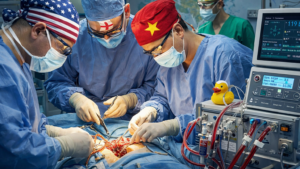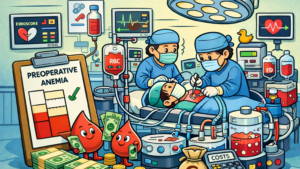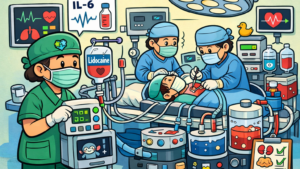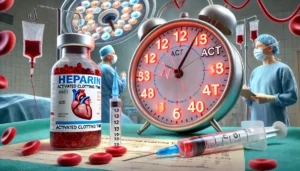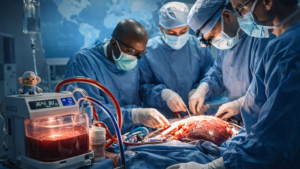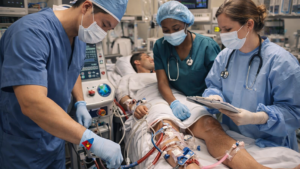Background: This study was conducted to test the hypothesis that phosphocreatine (PCr), administered intravenously and as cardioplegia adjuvant in patients undergoing cardiac surgery with prolonged aortic cross clamping and cardiopulmonary bypass (CPB) time, would decrease troponin I concentration after surgery.
Methods: In this randomized, double-blind, placebo-controlled pilot study we included 120 patients undergoing double/triple valve repair/replacement under cardiopulmonary bypass in the cardiac surgery department of a tertiary hospital. The treatment group received: intravenous administration of 2 g of PCr after anesthesia induction; 2.5 g of PCr in every 1 L of cardioplegic solution (concentration = 10 mmol/L); intravenous administration of 2 g of PCr immediately after heart recovery following aorta declamping; 4 g of PCr at intensive care unit admission. The control group received an equivolume dose of normosaline.
Results: The primary endpoint was peak concentration of troponin I after surgery. Secondary endpoints included peak concentration of serum creatinine, need for, and dosage of inotropic support, number of defibrillations after aortic declamping, incidence of arrhythmias, duration of Intensive Care Unit (ICU) stay, length of hospitalization. There was no difference in peak troponin I concentration after surgery (PCr, 10,508 pg/ml [IQR 6,838-19,034]; placebo, 11,328 pg/ml [IQR 7.660-22.894]; p = 0.24). There were also no differences in median peak serum creatinine (PCr, 100 µmol/L [IQR 85.0-117.0]; placebo, 99.5 µmol/L [IQR 90.0-117.0]; p = 0.87), the number of patients on vasopressor/inotropic agents (PCr, 49 [88%]; placebo, 57 [91%]; p = 0.60), the inotropic score on postoperative day 1 (PCr, 4.0 (0-7); placebo, 4.0 (0-10); p = 0.47), mean SOFA score on postoperative day 1 (PCr, 5.25 ± 2.33; placebo, 5,45 ± 2,65; p = 0.83), need for defibrillation after declamping of aorta (PCr, 22 [39%]; placebo, 25 [40%]; p = 0.9),, duration of ICU stay and length of hospitalization as well as 30-day mortality (PCr, 0 (0%); placebo,1 (4.3%); p = 0.4).
Conclusion: PCr administration to patients undergoing double/triple valve surgery under cardiopulmonary bypass is safe but is not associated with a decrease in troponin I concentration. Phosphocreatine had no beneficial effect on clinical outcomes after surgery.
Trial registration: The study is registered at ClinicalTrials.gov with the Identifier: NCT02757443. First posted (published): 02/05/2016.
Keywords: Anesthesia; Cardioplegia; Cardiopulmonary bypass; Intensive care; Myocardial protection; Phosphocreatine; Troponin; Valve heart surgery.


